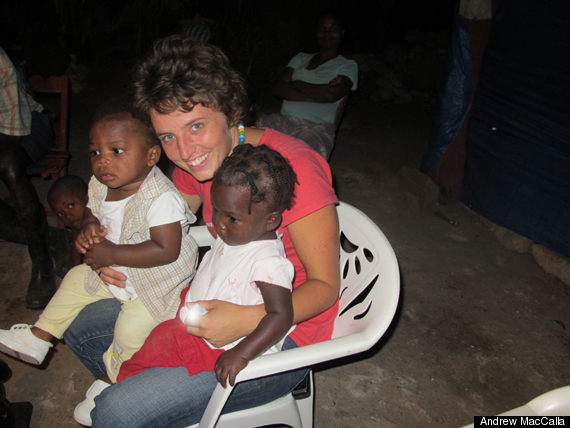
Much has been made of the unintended consequences that have come about as a result of the large-scale relief efforts in Haiti. Local rice producers can't sell their products because it is being given out for free just down the road. Daily wages have gone up as a result of NGOs hiring drivers and translators, thus making it hard for local businesses to keep their employees happy. And prices in the grocery stores have increased, making it hard for Haitians to buy food.
I've struggled with the idea that so much goodwill on the part of the world population may, at times, make things harder for the very people it is intended to help. How do you possibly plan for this? When a catastrophe like this occurs, all anyone wants to do is help. Indeed, the reason why NGOs exist is because the market forces aren't working for everybody in the first place. It seems strange to blame them for contributing to the problem.
In my time here, I've met some people who were working in Haiti before the earthquake and have had time to get accustomed, with some frustration, to the system. They have found an unmet need and they are filling it without causing damage to anyone's livelihood or way of life.
One is a woman named Sarah Wallace. Sarah is a 24 year-old midwife from Canada, CEO of Olive Tree Projects, and was named CNN's 3rd most intriguing person on January 20, 2010 (after Scott Brown and Barack Obama). Sarah came to Haiti in 2009 to open an orphanage. When she determined that many of the babies were becoming orphans as a result of the poor hospital conditions for pregnant mothers, she decided instead to open a birthing clinic in Jacmel. She is now employing locals to help run the clinic and is offering a full range of services for mothers and working within the public hospital to provide high quality services at a minimal cost to the patients.

Another is a woman named Anita Ennis who helps run Foyer St. Camille Hospital in Port au Prince. Of the roughly 50 hospitals and clinics I've visited in Haiti, this was perhaps the only one where I'd be comfortable having an appendix taken out or getting a broken leg set. It is staffed by nearly 20 Haitian medical personnel, has an emergency room, maternity clinic, and an amazing rehab facility. Additionally, there is an orphanage on the premises that looks after severely handicapped children. Seeing those orphans smiling and playing in that place made you simultaneously grateful that people like Anita exist and saddened that there aren't more like her. I can't imagine what a life for a handicapped orphan in Haiti would be like outside of this place.
I've heard some folks who have been in Haiti for a long time before the quake place blame on the new crop of volunteers for coming in and messing up 'their system'. I understand the concern. Any big disaster affects the economic equilibrium, whether New Orleans or Port-au-Prince. So does rapid, large-scale spending in a concentrated area, or the free provision of goods or services that someone is selling on the market. It's good to note these distortions, because it helps avoid predictable, negative unintended consequences of humanitarian assistance. But some of the criticism is unfair. No one is coming into Haiti to purposely damage the infrastructure. People just want to help. But I do think we can take a lesson from people like Sarah and Anita who have figured out a way to help people who would otherwise just not be helped.
This was also cross posted at https://hereinhaiti.blogspot.com
